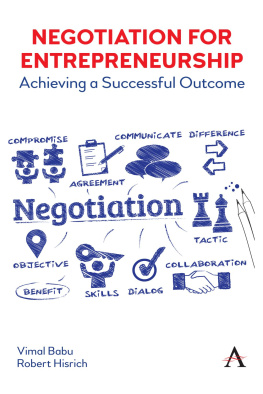
Negotiation for Entrepreneurship
DEDICATED TO
Our families, students and all those who want to experience negotiation in an entrepreneurial environment.
Negotiation for Entrepreneurship: Achieving a Successful Outcome
Vimal Babu and Robert Hisrich

Contents
I owe a lot of thanks to everyone who have helped me with this textbook. I really appreciate the conscientious and useful insights, contributions and suggestions from my coauthor and eminent Chair Professor of International Marketing, Kent State University, Ohio, USA, Prof. (Dr) Robert Hisrich. Indeed, it was full of umpteen learning experiences working with you.
At Anthem Press, I thank the Acquisition and Editorial Support team including Jebaslin Hephzibah, Courtney Young, Basheer Ahmed and Megan Greiving for their constant support. Thanks to the worldwide Anthem Press sales team, without whose tireless efforts this textbook would have rested on a shelf.
To thank my family at home, I would first and foremost acknowledge my mother Jayasree, my father Babu Kumar, my wife Parvathy (Ammu) for her unwavering support, my son Aditya (Aadi) for his insatiable curiosity to find out more about the how aspect of the textbook and, of course, my brother Vipin and sister Veena for motivating constantly and keeping me always in high feather.
It gives me great pleasure to write the foreword to this excellent book by Dr Vimal Babu and Dr Robert Hisrich. I have known both authors and particularly Dr Babu through their extensive academic and research endeavors, as well as their international consulting work.
When I look back on my career, I realize that a persons potential to solve problems and overcome obstacles is not in itself enough to make a contribution. Rather, to leave a mark, this potential must be harnessed and given expression through effective human behavior. After more than two decades of professional experience, I am convinced that good negotiation is a particularly important aspect of human behavior that can favorably influence the outcomes attained by an individual.
Moreover, it doesnt matter whether youre negotiating with a person from a different field or industry, what matters is how you structure your negotiation to meet your needs. This is particularly true for entrepreneurs. Entrepreneurs have to deal with a variety of different stakeholders in the context of their work. As a result, they have to be adept at negotiating when they collaborate with others and need to accomplish their goals through the involvement, commitment and engagement of others. Entrepreneurs are savvy negotiators when they can persuade, influence and convince people with enhanced trustworthiness, transparency and authenticity in their actions and responses.
There is a lot in this book to recommend to readers. There are chapters on the basics of entrepreneurship, conflict management and communication, as well as the psychological and behavioral dimensions of being an entrepreneur. There are also chapters on negotiation and entrepreneurial ventures that cover topics such as the process of negotiation, considerations for entrepreneurs who are women and how cultural diversity affects how entrepreneurs negotiate. In general, the authors have done well in selecting the most essential aspects of negotiation in the context of entrepreneurship with a focus on evidence-based discussions, real-life examples, case scenarios and thought-provoking questions as well as a rich reference list of readings to follow up with.
Its clear that both authors have a wealth of knowledge that they can draw up. They come from different walks of life, have a wide range of experiences and are experts in their respective fields of negotiation and entrepreneurship. Its also clear that the authors want readers to think entrepreneurially, establish entrepreneurial ventures, maximize the benefits and generate value for all stakeholders through effective negotiation skills in the short and long terms. Entrepreneurial negotiation is well understood by the authors due to their long-term, close relationships with thousands of entrepreneurs all over the world, as well as their extensive research, collaborative projects, training and consulting. Readers also stand to gain a great deal from the books rich and lucid writing.
In sum, I have no hesitation in stating that this book is a must-read for all prospective entrepreneurs: serial entrepreneurs, women entrepreneurs, minority entrepreneurs, ethnic entrepreneurs, youth entrepreneurs, student entrepreneurs, mid-career and established entrepreneurs alike.
Jaideep Prabhu, PhD
Professor of Marketing
Jawaharlal Nehru Professor of Indian Business & Enterprise
Director of theCentre for India & Global Business (CIGB)
Fellow of Clare College
Cambridge Judge Business School
University of Cambridge, UK
In the twenty-first century, the world has witnessed an unprecedented surge in the acceptability of entrepreneurship as a career. It is getting widely popular as a career option for youngsters and middle-aged people to solve societal problems and add significant value to the customers experience. Right from an idea to the execution and growth of an enterprise, entrepreneurship entails several steps and processes leading to the desired outcomes. Thus, it calls for unique skillsets by entrepreneurs. However, in each phase of entrepreneurshipfrom idea to the opportunity, from the opportunity to the business plan, from the business plan to funding the venture, from funding the venture to launching, growing and ending the venturethe entrepreneur needs to connect, communicate and empathize with the counterpart to set up, run and grow the entrepreneurial venture.
Specially, as mentioned, communication has a very crucial role to play in the entrepreneurial success of any venture. The important aspects of communication, such as, influence, persuasion and ability to convince others, are highly essential. The structured and polished approach to understand and apply such an advanced communication skill is recognized as negotiation. Thus, the art of negotiation is pivotal to the success of any entrepreneurial venture.
The book encompasses the entrepreneurs specific issues, dilemmas and complex situations in the VUCA environment. Various types and levels of negotiations are conducted between the parties involved to safeguard the mutual interests, goals and long-term relationships. Right from the beginning of startup idea to the exit of the venture involves several negotiation-based planning, strategies, tactics and description of cases in relation to competitors, suppliers, creditors, distributors, wholesalers, retailers, customers, government entities, civil societies, regulatory systems, international agencies and so on. Such varied forms of negotiation led to the venture creation, growth, expansion, diversification and, eventually, the successful exit of the venture in the longer run.
Negotiation skills are a universal requirement. However, the nature of problems differs for the entrepreneurs, unlike senior executives with limited authority and confined area of operations. Entrepreneurs are the highest risk takers in any business context. They are the ones who are going to lose entirely if the entrepreneurial venture fails. Besides, risk factor, they need to be innovators and carry multiple cognitive and non-cognitive skills to gauge the complex situations and opportunities as they arrive. They need to envision the blue ocean and be the first mover. They need to be intuitive and carry forward-thinking abilities to grab unforeseen opportunities in the market. These efforts and initiatives require them to be equipped with specific skills such as negotiation. It is to protect the best interests of both the parties or partners in the deal-making process. Even though negotiation styles and tactics may remain universal, however, the contextual difference, issues, nature of discussion, high-risk presence, types of stakeholders involved and so on make entrepreneurs inevitable to have the effective negotiation skills to sail through.
Next page












